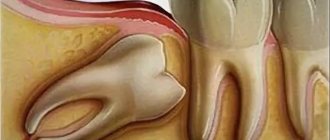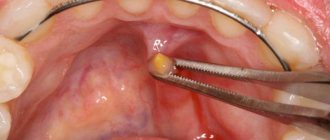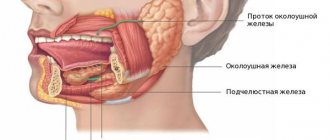About normal swallowing
Figure 1. Organs involved in swallowing
Many muscles and nerves work together to help you swallow (see Figure 1).
When you eat and drink, food and liquid mix with your saliva. Saliva softens and moistens food. Chewing allows you to break down food. When chewed, food and saliva form a bolus.
When swallowing, the tongue pushes food to the back of the mouth. After this, a reflex is triggered, and the root of the tongue pushes food into the esophagus. At this point, the larynx closes to prevent food or liquid from entering the airway (trachea). The food then passes through the esophagus and enters the stomach.
If the muscles in the mouth or throat are weakened, food and liquid can become stuck in the esophagus or enter the airways and lungs. Both of these situations can be dangerous.
The entry of food or liquid into the airways or lungs is called aspiration. Aspiration can lead to complications such as pneumonia (infection of one or both lungs) and respiratory infections (infections that affect the nose, throat, and airways).
to come back to the beginning
Diagnosis of pharyngitis
Typically, the ENT examines the patient's throat, as well as his nose and ears, carefully palpates the lymph nodes, and listens to breathing using a stethoscope.
The streptococcal test is a simple and accurate way to diagnose bacterial pharyngitis. The doctor takes a scraping from the child's throat, and within 24-48 hours the result is ready. Streptococcal pharyngitis will have to be treated with antibiotics.
We have our own laboratory in the clinic, so you can always take all the necessary tests with us!
How cancer and radiation therapy may affect swallowing
Depending on the size and location of the tumor, radiation therapy may weaken the muscles and organs involved in swallowing. They also may not work as well as they did before radiation therapy began. This may make it difficult for you to eat and drink.
Radiotherapy may cause:
- pain when swallowing;
- wounds (inflammation of the mucous membrane) in the mouth and throat;
- dry mouth.
- unusually thick saliva;
- swelling.
- Change in taste sensations
These symptoms usually appear 1-2 weeks after starting radiotherapy. These symptoms may become worse during treatment. Most symptoms will begin to subside approximately 2 to 4 weeks after treatment ends.
Radiation therapy can also cause permanent tissue scarring. The impact of such scars depends on which area is being treated. Some examples of the effects of scarring are described below.
- The muscles that attach to your jaw may tighten, making it difficult for you to open your mouth and chew food. This is called trismus.
- Your salivary glands may not produce enough saliva. This may make swallowing more difficult because your mouth will be too dry.
- The muscles in the tongue and back of the throat may also lose mobility. This may make it more difficult for you to push food or liquid down your throat and open your esophagus.
- The muscles that help protect the airway when swallowing may weaken. They may not be strong enough to prevent food or liquid from entering the airways.
- The esophagus may narrow. For this reason, food may get stuck in the back of the throat.
Not all patients will necessarily have all of these problems. Your treatment will be planned to reduce the likelihood of these problems occurring. Your healthcare team will also teach you techniques that can help you cope with these problems.
Other treatments may also affect swallowing. The surgery may affect areas of the mouth and throat, which may make swallowing difficult. Some chemotherapy drugs can cause sores in the mouth and throat. This can make swallowing painful.
to come back to the beginning
Managing swallowing problems
Having trouble swallowing is called dysphagia. Your healthcare team can help you manage your dysphagia. Your team includes doctors, nurses, a swallowing specialist, and a clinical dietitian.
You will meet with a swallowing specialist before, during, and after treatment. This specialist:
- explain how treatment may affect swallowing;
- will teach you how to perform exercises to stretch and strengthen the muscles involved in swallowing;
- will monitor any changes in your ability to swallow as you progress through radiotherapy;
- will help you maintain your ability to swallow after treatment ends to prevent long-term or delayed changes.
Pain when swallowing
If you have pain when swallowing, your healthcare team will give you pain medicine to help you manage the pain. Follow your doctor's directions for taking your medication. If it doesn't help, tell your doctor or nurse. There are a wide variety of medications that can be used to relieve this type of pain.
Aspiration
If you have trouble swallowing, food or liquid may accumulate in the back of your throat. This increases the risk of aspiration. Signs of aspiration include:
- cough when swallowing;
- cough after swallowing;
- change in voice while eating or drinking.
If any of these signs occur, contact your swallowing specialist immediately. This specialist will assess whether your ability to swallow has changed and may recommend foods and drinks that are safe to swallow. You will also be given help with swallowing exercises to help prevent your ability to swallow from getting worse.
Call your doctor or nurse right away if you have any of the following symptoms:
- dyspnea;
- whistling when breathing;
- pain when breathing;
- cough with phlegm or mucus;
- temperature 100.4°F (38°C) or higher.
These may be signs of developing pneumonia or a respiratory infection.
Lockjaw
Trismus is a condition where you cannot open your mouth as wide as usual. Trismus can occur at any time, immediately after or even years after treatment.
If you cannot open your mouth wide enough, it will be difficult for your doctor to examine your mouth. This may also be due to other problems, for example:
- Irrigating the mouth and brushing teeth (oral hygiene), which can lead to bad breath, tooth decay and oral infections;
- chewing and swallowing, which may make it difficult for you to eat and drink;
- speech;
- kisses;
- insertion of a breathing tube, for example if you ever need general anesthesia (a drug given to keep you asleep during an operation or procedure);
- carrying out routine dental treatment.
When trismus occurs, its treatment is very difficult. This is why it is important to prevent trismus and treat the condition as early as possible. Your swallowing specialist will teach you exercises to help prevent trismus. It is also important to maintain good oral hygiene and good posture.
to come back to the beginning
Exercise stress
These exercises will help prevent your ability to swallow from deteriorating during radiation therapy. They will also help you maintain your ability to swallow over time. Your swallowing specialist will tell you when to start these exercises. Exercises will not be beneficial if you start them too soon after surgery or too early before radiation treatment.
Perform each exercise 10 repetitions 3 times a day. If your swallowing specialist tells you to do them more often or less often, follow these recommendations.
Exercises to improve swallowing
Tongue holding exercise (Masako exercise)
- Place the tip of your tongue between your front teeth.
- Swallow. While swallowing, hold your tongue between your front teeth.
Between swallows, you can relax and return your tongue to its normal position.
Forceful swallowing exercise
- Swallow as usual, but tense the muscles of your throat and tongue.
Imagine swallowing something large (like a spoonful of peanut butter). This will help you tighten your muscles a lot.
Mendelssohn swallowing exercise with maneuver
- Swallow as normal, but when you feel your throat and Adam's apple rise, pause for 2 seconds before relaxing your muscles at the end of the swallow.
To pause, you can imagine holding your breath as you take a sip for 2 seconds before relaxing. You can also touch your hand to your throat to feel when the muscles rise or tense as you swallow.
Swallowing exercise for the supraglottic area
- Inhale and hold your breath.
- Hold your breath and swallow.
- Forcefully exhale or cough out any trapped air.
Shaker exercise
- Lie down on the floor or bed.
- Raise your head as if you were looking at your toes.
- Lower your head to the starting position.
- Repeat this movement 30 times.
- After this, raise your head. Hold it in this position for 60 seconds, or as long as you can. Then relax.
Exercises on the range of motion of the tongue
Tongue protrusion exercise
- Stick your tongue out as far as possible until you feel a good stretch.
- Hold it in this position for 5 seconds.
Tongue retraction exercise
- Retract your tongue into the back of your mouth as if you were gargling or yawning.
- Hold it in this position for 5 seconds.
Tongue retraction exercise
- Move your tongue to the left as far as possible until you feel a good stretch.
- Hold it in this position for 5 seconds.
- Move your tongue as far to the right as possible until you feel a good stretch.
- Hold it in this position for 5 seconds.
Exercise for the tip of the tongue
- Press the tip of your tongue against the back of your upper teeth or gums.
- Holding it in this position, open your mouth as wide as possible for 5 seconds.
Exercise for the root of the tongue
- Say the sound “k” or “ka” loudly. To do this, you should move the root of your tongue to the back of your throat.
Jaw Exercises
Range of motion and stretching exercises
Sit or stand. Your head should remain in one position while performing these exercises.
- Open your mouth as wide as possible until you feel a good stretch but no pain (see Figure 2). Hold this position for 10 seconds.
- Move your lower jaw to the left (see Figure 3). Hold this position for 3 seconds.
- Move your lower jaw to the right (see Figure 4). Hold this position for 3 seconds.
- Make circular movements with your lower jaw to the left.
- Make circular movements with your lower jaw to the right.
Figure 2. Open your mouth
Figure 3: Move your jaw to the left
Figure 4: Move your jaw to the right
Passive stretching exercise
Figure 5. Give extra support with your fingers.
- Press your thumb against your upper front teeth.
- Press the index finger of your other hand against your lower front teeth (see Figure 5).
- Open your mouth as wide as possible. Place additional emphasis with your fingers so that your mouth does not close. You should feel a slight stretch, but not pain.
- Hold this position for 15-30 seconds.
If your swallowing specialist notices any changes in your ability to swallow, they may give you other exercises or tell you about other ways to maintain swallowing function during treatment.
to come back to the beginning
Treatment
Viral pharyngitis usually resolves within 5-7 days. The child should be provided with:
- peace and the opportunity to sleep as much as he wants;
- Drink plenty of fluids to relieve sore throats and prevent dehydration;
- air humidification;
- a sore throat can be relieved by both warm drinks and cold ice cream, especially popsicles;
- for a sore throat, it helps to gargle with a solution of table salt - a teaspoon per 250 ml of warm water;
- Children over 4 years old can be offered lozenges for sore throats. Do not give candy to small children - they may choke;
- do not smoke when your child is sick, avoid strong odors that irritate the throat;
- A sore throat and fever can be relieved by medications containing paracetamol and ibuprofen. Don't give children aspirin; in rare cases, it can cause deadly Reye's syndrome.
Confirmed bacterial pharyngitis is treated with antibiotics. You should not interrupt or stop the course, because this increases the likelihood of infection spreading to the joints, heart, kidneys and other organs. Continue taking antibiotics even if your symptoms are completely gone.
You can make an appointment with our doctor by phone: + 7 812 327 03 01 or online on the clinic’s website.
Dietary recommendations
A balanced diet is an important part of cancer treatment. If you have pain when swallowing or have trouble swallowing:
- You may not be able to eat enough food. This may cause you to lose weight or have low energy.
- You may not be able to drink enough fluids. This can lead to dehydration.
Your swallowing specialist, nurse, doctor, and clinical dietitian dietitian will tell you what you should eat and drink during treatment. Your swallowing specialist will recommend foods and liquids that have the right consistency. When you try new foods and liquids, make sure they are the consistency recommended by your swallowing specialist.
Your healthcare team may also recommend that you take a nutritional supplement (such as Ensure®) to increase your calorie intake. You can buy dietary supplements at your local grocery store, pharmacy, or order online.
For more dietary advice, see Eating Well During Cancer Treatment and Guidelines for Puréed and Soft Diets.
Control dry mouth or thick saliva
Try the following tips if dry mouth or thick saliva is bothering you:
- Drink 8–10 cups of fluid per day. Getting enough fluid in your body will help make your saliva thinner.
- Carry a bottle of water or other liquid with you when you leave the house. Take small sips of it often.
- Chew sugarless gum or suck on sugarless hard candies. This may stimulate saliva production.
- Add sauces, gravies and other liquids to food.
- Use a humidifier to help thin your saliva and other secretions.
- Rinse your mouth frequently throughout the day with a mixture of 1 liter (about 4.5 cups) of water, 1 teaspoon of salt and 1 teaspoon of baking soda. You can drink the mixture in small sips, rinse your mouth with it, or gargle.
to come back to the beginning
Nervous throat
Every patient has the right to receive a full medical verdict if it is so important for him to calm down and stop beating himself up. But there are three signs by which a person is able to independently determine whether his swallowing process really has a connection with nerves, and not with organic diseases:
- Upon waking up, the patient may not experience difficulty swallowing for some time. The brain needs at least 15 minutes to “remember” the current problems and get ready to repeat them.
- Cancer and thyroid are, of course, no joke. But, oddly enough, they do not cause pharyngeal spasms during swallowing saliva. And when such problems begin, the diseases are already so obvious and accompanied by additional painful symptoms that it is impossible to doubt them.
- If you get too carried away by something, you may not even notice how saliva has successfully passed along its route to the stomach several times. But as soon as the patient comes to his senses, he again cannot swallow.









